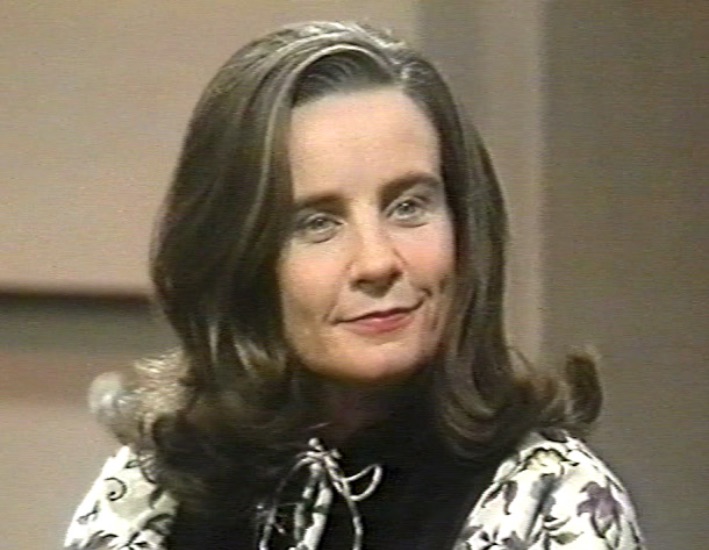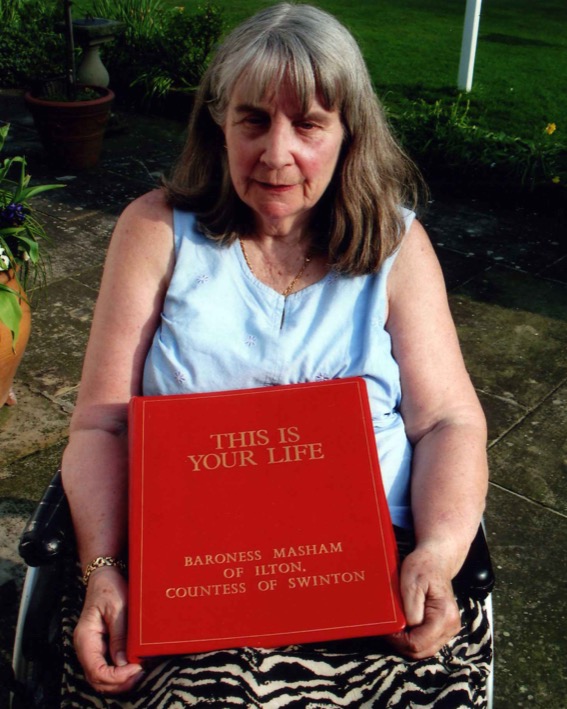Big Red Book
Celebrating television's This Is Your Life
Baroness MASHAM of Ilton, Countess of Swinton (1935-2023)

THIS IS YOUR LIFE - Lady Masham, Paralympian, life peer and disability campaigner, was surprised by Eamonn Andrews in the foyer of the De Vere hotel in Kensington, London, having been led to believe she was there for an interview.
Susan, who was born in Caithness, was a keen rider in her youth and took a job at a stable in Swindon following her education. A riding accident in 1958 left her paralysed, but despite her disability, she competed in several Paralympic Games, winning medals for table tennis in 1960, 1964, and 1968.
In 1959, she married Lord Masham and became Lady Masham, and later the Countess of Swinton. She was created a life peer in 1970 as the Baroness Masham of Ilton, a title she held in her own right. As the youngest ever life peeress and an active member of the House of Lords, she became a champion for causes related to disability.
programme details...
- Edition No: 427
- Subject No: 424
- Broadcast date: Wed 4 Feb 1976
- Broadcast time: 7.00-7.30pm
- Recorded: Wed 28 Jan 1976
- Venue: Euston Road Studios
- Series: 16
- Edition: 13
- Code name: Triumph
on the guest list...
- David, Lord Masham - husband
- Fred Trueman
- Gwen Buck - in audience
- Jan Lawton - in audience
- Reba Hildreth - mother
- Lt Col Hildreth - stepfather
- Sir John Sinclair - brother
- Vinnie MacGregor
- Hugh Newcombe
- Sir Ludwig Guttmann
- Dr Lorenz Michaelis
- Rosie Schweitzer
- John Cooper
- Graham Fletcher
- Ann Moore
- Paddy Farrell
- Alfred Morris
- Clare - daughter - via telephone
- John - son
- Borghild Myhre Filmed tributes:
- Robert Boothby
- Vic Feather
related appearance...
- The Night of 1000 Lives - Jan 2000
production team...
- Researcher: Lavinia Warner
- Writers: Tom Brennand, Roy Bottomley
- Director: Mike Dormer
- Producer: Jack Crawshaw
- names above in bold indicate subjects of This Is Your Life
celebrating the world's best
a celebration of a thousand editions
Lady Masham recalls her experience of This Is Your Life in an exclusive interview recorded in April 2007













Screenshots of Lady Masham This Is Your Life - and Lady Masham photographed at her home with her big red book in April 2007

1974 was, I think, the busiest year of my life. I was invited to give talks on what it was like to be disabled, how to take part in sport, riding, gardening and all the different activities one can still take part in if one has to use a wheelchair. I opened conferences, I took part in conferences, I drove hundreds of miles. I also did several television programmes. I found some TV companies were far more generous than others; Anglia looked after me the best. On one occasion a television programme was a very great surprise.
We were preparing to leave for our usual journey to London, and David said I should bring a dress because we had to go to a party one evening. He did not tell me what it was, which was very unusual for him, as we generally talk over our social engagements. Anyway, I packed a dress. Then one day while we were in London David said I could not go to the meeting I was due to attend at the House of Lords because we had to go back to the hotel. But he still did not tell me what was happening - I was mystified. A rather agitated David picked me up at the House of Lords and we drove to the De Vere Hotel, where we were staying at the time. As I was getting out of the taxi I noticed a television camera, then I saw Eamonn Andrews and I guessed what it was - I was to be the guest on This Is Your Life. I was even more confused to see George Wilson, the Director of the Royal Association of Disability and Rehabilitation, who was supposed to be speaking at the meeting I was meant to have been attending at the House of Lords - but I think I was meant to be confused. Then I had to change and we went off to the television studios to do the programme.
It was a very moving experience, because I did not know who was going to come on next. There were various people I had known as a child in Scotland, people I had been in hospital with, the friend who had introduced me to David, and my very dear nanny Mimmie, who had looked after me until I was eleven. She came on first of all on film, speaking from Norway, then at the very end she walked into the studio - the first time I had seen her since I visited Norway when I was twenty-one. I think that was the greatest surprise of all. I asked David why, as they had two of the doctors from Stoke Mandeville, Dr Ludwig Guttmann and Dr Michaelis, they didn't have my physiotherapist Jeannette Benn from Australia, and very sadly I learnt she had died of cancer.
After that programme I had even more letters than I had had after the Woman's Own article. They came from all over the world, and my study at home is full of files from people who have problems through disablement or who have a disabled friend or relation. Some cases were particularly disturbing, as they had had no rehabilitation.
The Telegraph 1 June 2022
Baroness Susan Masham is a trailblazing Paralympian and peer in the House of Lord's
By Rob Bagchi
As she set off for the Tokyo Paralympics, her husband pushing her wheelchair across the concourse at London airport, Susan Cunliffe-Lister, Dowager Countess of Swinton, Baroness Masham of Ilton, might well have wondered how a disabled person would be received in other parts of the globe in the mid-1960s.
Four years earlier, in Rome for the Ninth International Stoke Mandeville Games for wheelchair users - retrospectively recognised as the first ever Paralympic Games – she had won a gold and four silver medals in the pool, as well as a bronze medal in table tennis. Rome, she had reflected afterwards, had been "interesting."
"We arrived in Rome to find that the Olympic village where we were housed was built on stilts," she later laughed, "how were they going to get 400 wheelchairs up and down? They had to bring the Italian army in."
Her trailblazing gold medal became the centre of an Italian media storm. Out for dinner with a friend one night, she thinks it must have slipped out of the side of her wheelchair. The Roman press, however, embroidered that story to imply that she had thrown it into the Trevi fountain, as the ultimate offering to guarantee a return to the Eternal City.
In Tokyo, there would be other cultural misunderstandings. "The Japanese people didn't think a disabled person could be married," she said of her husband, Lord Masham, who had stayed with her in the athletes' apartment, "making cups of tea" for her fellow competitors.
Across three Paralympic Games - including Tel Aviv in 1968 – she would go on to win one gold and four silver medals in swimming events and two gold, two silver and one bronze across doubles and singles table tennis.
A decade earlier, Masham had been a keen equestrian. But competing in a point-to-point race in March 1958 she had been thrown at the fourth fence, her horse landing on top of her. Just 22 years old, she woke up in hospital with a transverse fracture of the fifth, sixth and seventh vertebrae and was paralysed from the waist-down.
After two weeks Masham was transferred to the National Spinal Injuries Centre at Stoke Mandeville Hospital under the care of the now legendary Sir Ludwig Guttmann, where she stayed for nine months, blessed, she feels, that Guttmann placed so much emphasis on sport as rehabilitation therapy and an indispensable psychological incentive for his patients to accept their changed physical circumstances did not mean the end of an active life. "I was lucky," she said. "It helped me to recover more quickly."
Masham's life was to take an entirely different course. "I realised that all the things like skiing, point-to-pointing and dancing, that I would not be able to do again, would have to be replaced," she said. "So I had to get on with living." Masham found the sensation of weightlessness in the pool at Stoke Mandeville a relief, and enjoyed taking up swimming. Guttman's emphasis on sport was to change her life trajectory.
Guttmann was one of the principal guests invited to pay tribute to Masham on a 1976 episode of This Is Your Life, when she was surprised by Eamonn Andrews in the foyer of the De Vere Hotel with his Big Red Book. "It was very emotional," she said as she was reunited with the staff from Stoke Mandeville, and her childhood nanny.
Ennobled in 1970 as a crossbencher, she went on to forge an influential career in politics and the public sphere. "Guttmann was very pleased about that," she later reflected.
"He said to me, 'Oh you must make them aware of other disabled people.'"
Eight weeks after taking her oath, Masham made her maiden speech during the second reading of the 1970 Chronic, Sick and Disabled Persons Act. It was the first legislation in the world to recognise and give rights to people with disabilities, and seen as a ground-breaking step towards equality.
Masham remains the longest serving woman in the Lords and still plays a key role as president of the Spinal Injuries Association, the charity she founded in 1974. An indefatigable campaigner on disability issues, addiction illnesses and penal reform in parliament, she is also vice-president of Riding for the Disabled among myriad other organisations - her love of horses enduring, when others may have cursed them for the injuries they caused her.
At 87 Masham continues to be a force of nature. In an interview as recent as 2018, she confessed that she still manages to play table tennis, "[though] I have to watch my shoulders – I've worn them out because I played so much."
Series 16 subjects
Ronnie Dukes | Ray Milland | Mike Hailwood | Frank Windsor | Magnus Pyke | Bill Tidy | Gladys Mills | Andy StewartWindsor Davies | Ray Reardon | Patrick Mower | Alberto Remedios | Susan Masham | Betty Driver | Henry Davies
Gwen Berryman | Vince Hill | Arnold Ridley | Beryl Reid | Alan Mullery | Percy Thrower | Gareth Edwards
June Whitfield | Terry Fincher | Richard Dunn | Norman Croucher